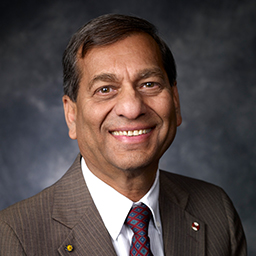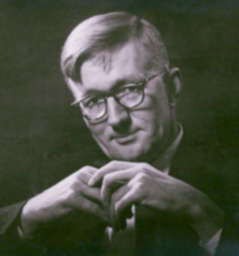

The secret to a supply chain’s success is designing a contract that encourages partners in a supply chain—including suppliers and retailers—to collaborate and make decisions that are in the best interest of the supply chain as a whole, says a renowned operations management professor at the Naveen Jindal School of Management.
Dr. Suresh Sethi, Eugene McDermott Chair of operations management, spoke recently to students, staff and faculty members at the 2016 Polykarp Kusch Lecture. Sethi’s talk, “Conflicts in Supply Chains and Contracts that Restore Efficiency,” concerned the most efficient way to design supply chains, the relationships that exist between independent groups that cooperate to take raw materials and deliver them to customers as finished products or services.
Sethi is internationally recognized for applying quantitative methods to areas of manufacturing and operations management, finance, economics and marketing.
Suppliers and retailers make independent decisions based on their own self-interests in a decentralized manner, often leading to decisions that are not best for the total supply chain, Sethi told the audience. However, companies that collaborate effectively across the supply chain enjoy dramatic reductions in inventories and costs, along with improvements in speed, service levels and customer satisfaction.
“There’s invariably a conflict between the two agents with their own objectives trying to maximize their profits. It’s a tug of war in some sense. One of the two of course has more control. So there is this loss of efficiency, which is not as good as when the two can collaborate and make decisions together that benefit all,” Sethi said. “We can design contracts that align each one’s objective with the objective of the total supply chain.”
For example, Sethi described the competing self-interests that exist between a book supplier and a book retailer. It is in the supplier’s best interest to sell as many books to the retailer as possible; however, it is in the retailer’s best interest to buy only a quantity he is certain he can actually sell.
“The retailer is facing an uncertain demand, and when he orders too much, he will get stuck with many books that he cannot sell. That’s why the retailer independently will order a lesser quantity than if the supply chain were one company, because he does not want to take the risk of getting stuck with too many unsold products given the uncertain demand he faces,” Sethi said.
There are contracts that will allow the supplier and retailer to make decisions independently but also ensure maximum profitability for both parties, Sethi said. One such contract is a “buyback contract” that allows the retailer to return unsold books to the supplier at an agreed-upon price, reducing the retailer’s risk and encouraging him to order a higher quantity.
“There are a number of wholesale and buyback prices that the supplier can design that will allow the retailer to order just the quantity that is good for the total supply chain,” Sethi said.
Sethi’s research areas are supply chain management, stochastic inventory models, dynamic advertising problems and mathematical finance. He developed the first stochastic advertising model, known as the Sethi model, which is used to analyze the dynamic relationship between advertising and sales.
When he arrived at UT Dallas in 1997, he embarked on building a first-class group in operations management and established the operations management doctoral program, which is now recognized worldwide.
Sethi was introduced at the lecture by Dr. Hasan Pirkul, Jindal School dean and Caruth Chair of Management.
“I have seen many senior faculty members who have hired many outstanding faculty members. They tend to be in their field or close to their research area. Dr. Sethi, on the other hand, has hired great faculty members who are not in his field and have nothing to do with what he does. To me, that’s truly a sign of great intelligence,” Pirkul said. “He has respect for research regardless of the research paradigm the research takes place in, and he respects people who have accomplished in their own disciplines. That has made it possible for us to put together a world-class operations department. We owe you one, Suresh, and we can never repay you and the University can never repay you.”
Polykarp Kusch was the 1955 Nobel laureate in physics. He joined UT Dallas in 1972 and was a UT System Regental Professor. When he retired, the University endowed a program of annual lectures with the theme “Concerns of the Lively mind” in his honor.






